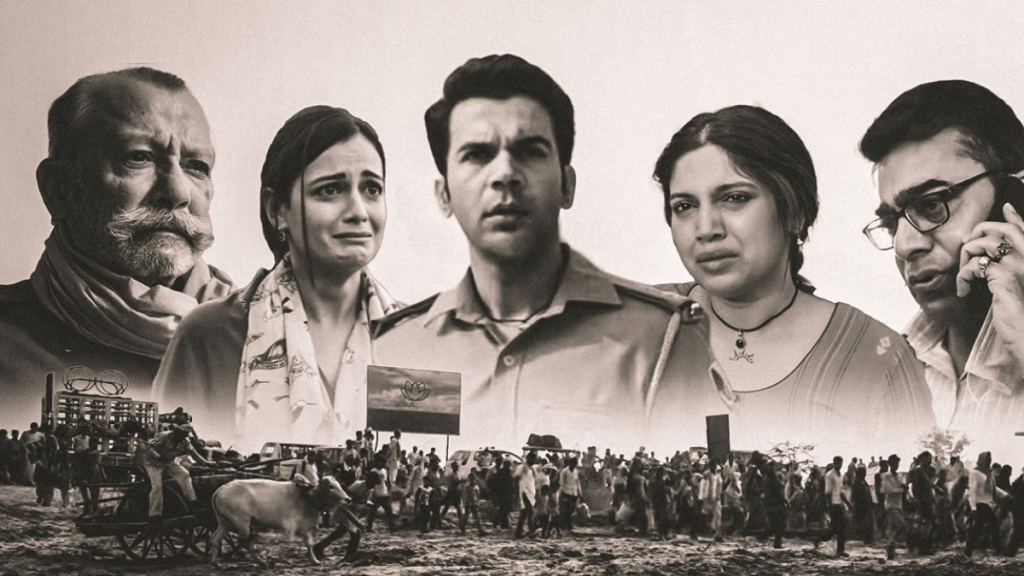Anubhav Sinha’s Bheed is an intense and vivid portrayal of the struggles endured by Indian migrant workers during the COVID-19 pandemic. The film opens amidst the chaos of a sudden nationwide lockdown announced on March 24, 2020. The lockdown left millions of daily wage earners stranded without work or a means to return home.
Bheed: What happens in the end?
The narrative revolves around multiple characters whose lives intersect at a police checkpoint in Tejpura. The central figure is Surya (Rajkummar Rao), a police officer from a lower-caste background. Surya is stationed at the checkpoint to enforce the lockdown restrictions. Surya’s story intertwines with his personal life, as he is in a relationship with Dr. Renu (Bhumi Pednekar), a woman from an upper-caste family. Their inter-caste relationship faces societal and familial resistance, highlighting the prevalent caste dynamics in India.
Parallel to Surya’s story is Trivedi (Pankaj Kapur), a security guard traveling back to his village. Trivedi’s character is shaped by misinformation and rumors spread through social media. This leads to his prejudiced views against the Muslim community. This subplot underscores the impact of unverified news and communal bias during the pandemic.
The film also introduces us to a mother (Dia Mirza) attempting to reach her daughter. Additionally, a young girl (Aditi Subedi) struggling to take her father (Omkar Das Manikpuri) to their village.
Bheed also shows a journalist, Vidhi Prabhakar (Kritika Kamra), reporting the ground realities at the checkpoint. Each character brings a unique perspective to the narrative, depicting various facets of the social and economic crisis.
The plot takes a dramatic turn when Surya and Trivedi’s paths cross. Trivedi, driven by desperation and misinformation, clashes with the authorities over access to food and shelter. In a climactic sequence, Surya helps Trivedi escape from the police by staging a hostage situation. This act of rebellion by Surya is both a personal stand against the systemic oppression he faces and a humanitarian gesture to aid Trivedi.
What happens to Trivedi?
The film’s conclusion is bittersweet and thought-provoking. Surya confronts his superior, Yadav (Ashutosh Rana), challenging the deep-rooted casteism in the system. Despite the risk of losing his job, Surya ensures that the checkpoint remains operational to aid the migrants. On the other hand, Trivedi, realizing the implications of his actions, avoids a police encounter by bribing an officer, showcasing the stark differences in societal power dynamics based on caste and economic status.
Bheed ends with a haunting visual of the field near the checkpoint, filled with migrant workers—a stark reminder of the scale of the human tragedy that unfolded. The film is not just a story of individual struggles but a powerful commentary on the broader societal and governmental failures during the pandemic. It sheds light on the plight of the marginalized, the spread of misinformation, and the deep-seated biases that divide society.
Anubhav Sinha’s Bheed is a masterful blend of social commentary and human drama. It serves as a mirror to the societal issues exacerbated by the pandemic and stands as a testament to the resilience and struggles of millions of Indians during one of the most challenging times in recent history. The film leaves its audience with a lasting impression of the need for empathy, solidarity, and collective action in the face of adversity.










